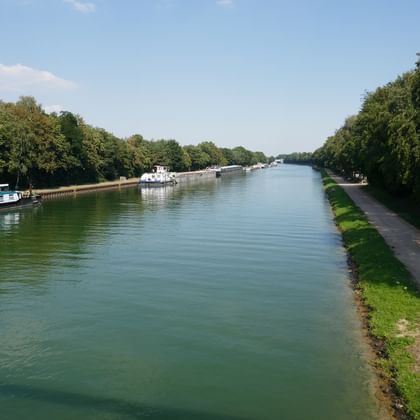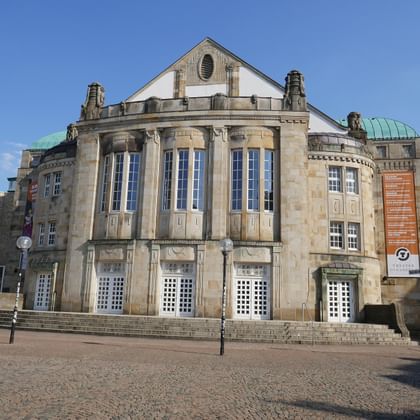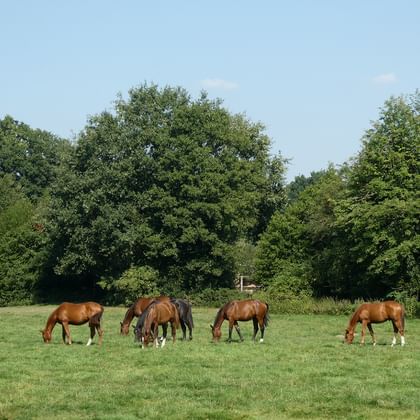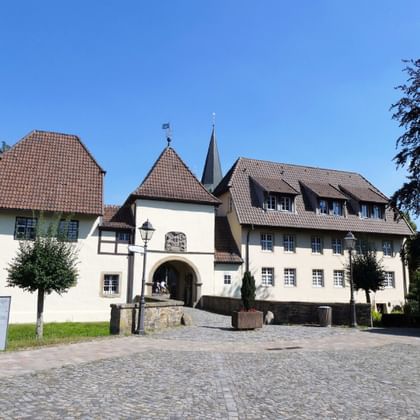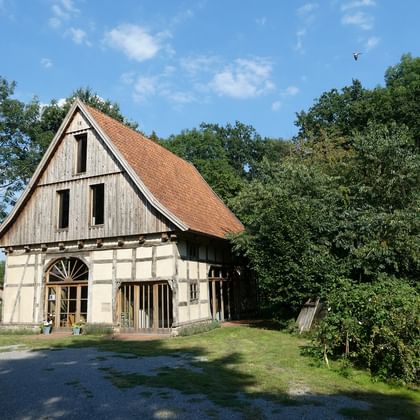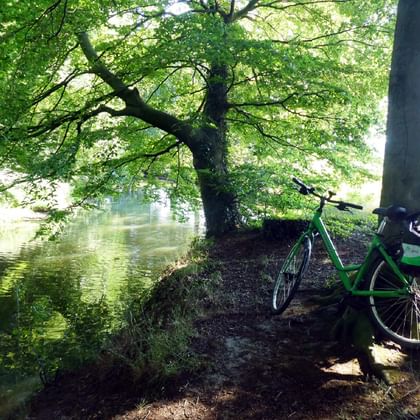Tour
You should plan to spend some time in Rheine when you arrive, as there is plenty to discover: the pretty old town with St. Anthony's Basilica and the historic Ems weir, and much more. Rheine offers the perfect combination of history, nature and relaxation.
Cycling along the Aa, you will pass through peaceful, unspoilt countryside characterised by meadows, small woods and babbling brooks. Plan a stop in Höstel to visit Gravenhorst Abbey with its art and culture centre. Then continue your tour to Osnabrück – a city steeped in history and vibrant present. Here you can explore sights such as the Town Hall of the Peace of Westphalia, the mighty St. Peter's Cathedral or take a leisurely stroll through the old town with its half-timbered houses and unique boutiques.
Your route takes you over the gentle hills of the Wiehengebirge, where sweeping views alternate with quiet paths through forests and fields. Bramsche is a great place to take a break, whether you visit the Tuchmacher Museum or stroll through the historic town centre. Shortly before Bersenbrück, you will reach the Alfsee, a popular local recreation area that attracts visitors with its numerous leisure activities. Your destination today is the small town of Bersenbrück, which invites you to explore and linger with its monastery complex, well-kept parks and inviting town centre.
Your cycle tour continues along the Hase, which winds its way through a varied cultural landscape in gentle curves. Forests, fields and small villages accompany you along the way, lending this stage its special charm. In Quakenbrück, the heart of the historic Artland region, you will immerse yourself in a unique cultural heritage: magnificent half-timbered houses and an architectural ensemble of particular value tell of the rich history of this region. Via Essen (Oldenburg), you then cycle along quiet paths through the open expanse of fields, where you can enjoy the tranquillity of nature. Finally, you reach Löningen, the destination of your stage. With its relaxed small-town atmosphere, inviting waterfront promenade and cosy places to stop for refreshments, Löningen is the perfect place to end the day in peace.
Your journey continues into the vast Emsland region, where fields, meadows and small forests present a gentle variety. Along the way, you will reach Haselünne, the oldest town in the Emsland region. It is particularly worth stopping here: the historic town centre with its picturesque alleys and traditional grain distilleries give the place a character all of its own. From there, you continue to follow the course of the Hase until you reach Meppen, where the Hase and Ems rivers converge. The charming ‘city on the water’ welcomes you with impressive buildings, green riverside paths and a lively city centre that invites you to stroll and linger.
Your route takes you upstream along the Ems through quiet floodplains and extensive moorland. A highlight of this stage is the Bourtanger Moor-Bargerveen International Nature Park, where you can discover a unique high moor landscape with rare plant and animal species – a particularly charming nature experience. Finally, you will reach Lingen, the largest town in the Emsland region. With its historic old town, inviting market square and numerous cafés, it exudes a lively atmosphere and offers the ideal setting to relax and unwind at the end of the day.
Your cycle tour continues along the Ems, past wide fields, quiet meadows and small villages that make up the special charm of the Emsland region. In Emsbüren, we recommend a detour to the Emsflower Erlebnispark: here you can expect tropical plant worlds, colourful butterflies and lush flowers – an experience for all the senses. A stop in Salzbergen is also worthwhile. This traditional community is one of the oldest in the Emsland region and delights visitors with its historic church and small, lovingly designed local history museum. From here, it is only a short distance to Rheine, where your varied round trip along the Hase and Ems rivers comes to an end in an atmospheric setting.
After breakfast, your tour of the Hase and Ems rivers unfortunately comes to an end. We would be happy to book additional nights for you in Rheine so that you can continue exploring the region.
Map
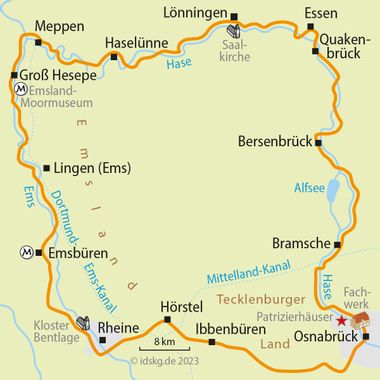
Prices / Dates
Services / Info
- Accomodation with breakfast in 3- and 4-star hotels as well as in charming guesthouses and traditional inns
- Rooms with shower/bath/WC
- Luggage transportation
- Personal tour information on site
- Digital route book
- Navigation app and GPS data
- 7-day hotline service
Below please find more information about your bike trip. If you have any further questions please feel free to contact us by phone: 0049 - (0)6421-886890.
Arrival by train
Rheine is easily accessible from all major cities in Germany by train. Current schedule information and price information can be found at: www.bahn.de.
Parking facilities at the arrival hotel
The partner hotels in Osnabrück offer parking with limited spaces. There are several car parks in the vicinity of the starting hotel. Advance reservations are not possible, and payment is due on site. Detailed information about parking at your booked hotel will be provided with your detailed travel documents two weeks before departure.
Condition of the cycle paths
The routes are mostly flat or run through gently undulating terrain. Cycling is mostly on asphalted or paved farm tracks, occasionally on small side roads or cycle paths.
Available rental bikes
Comfortable touring bikes with hub gears and coaster brakes or derailleur gears without coaster brakes. Electric bikes are also available. Simply specify your bike preference when booking.
Extra costs which are not inculded
Any tourist tax and charging fees for bicycle batteries are not included in the tour price and must therefore be paid at the hotel.
7 day hotline service
Just in case the bike chain breaks, flooding makes it impossible to continue your tour or any other nasty surprise: You can reach us seven days a week and we will do anythig to help you as fast as possible.
Passport and visa requirements
For EU citizens, there are no special passport or visa requirements and no health formalities to be considered for this trip.
Travel insurance
The tour price already includes the statutory insolvency insurance. In addition, we recommend that you take out travel cancellation insurance upon receipt of your travel confirmation in order to protect yourself against financial disadvantages in the event of travel cancellation, interruption of travel, illness or accident.
For this trip, we recommend using digital travel documents in the spirit of sustainability. However, you can still select printed travel documents with a cycling map during the booking process if you wish. Please note that prices may vary depending on your selection.
4 out of 5 stars

I provide you with advice and assistance
Miriam Houda
